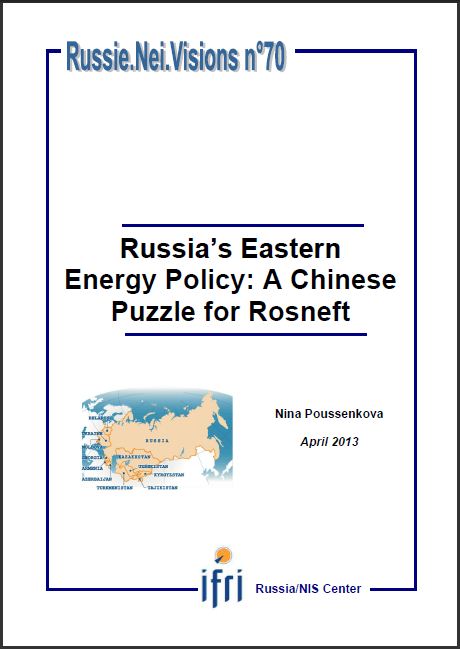Russia's Eastern Energy Policy: A Chinese Puzzle for Rosneft

In the past decade Russia set a strategic goal: to develop the Eastern vector of its energy policy and strengthen oil and gas cooperation with the Asia-Pacific countries. While dialogue on gas with China was stalled, Rosneft, the country's number-one oil company, made a breakthrough in petroleum relations.
Rosneft received credits from Chinese banks against guaranteed supplies of oil; lobbied for the construction of a spur to China from the Eastern Siberia—Pacific Ocean pipeline system; dramatically increased oil exports to China; let CNPC and Sinopec enter the Russian upstream; cooperated with them abroad; sold some of its shares to CNPC, and consolidated its position in China's downstream. The state company is fulfilling the government's strategic plans on the diversification of markets for hydrocarbons and the development of the East of the country, while simultaneously influencing state energy policy.
Rosneft has its own long-term plans to become an international energy corporation and it is pursuing the internationalization of its business, including in the Asia-Pacific markets. Yet thanks to China, Rosneft is also supporting its short-term corporate interests: the first two loans were used to pay for the acquisition of Yukos, and now it plans to attract the Chinese money to buy TNK-BP. Therefore, the key question remains: Do its corporate interests correspond to the long-term goals of Russia, in so far as they place the country in a position of dependence on China?
Download the full analysis
This page contains only a summary of our work. If you would like to have access to all the information from our research on the subject, you can download the full version in PDF format.
Russia's Eastern Energy Policy: A Chinese Puzzle for Rosneft
Related centers and programs
Discover our other research centers and programsFind out more
Discover all our analysesDeathonomics: The Social, Political, and Economic Costs of War in Russia
The report attempts to outline and examine a truly new phenomenon in Russian society, dubbed “deathonomics”—the making of a mercenary army against the backdrop of the Kremlin’s war in Ukraine, eventually replacing both the Soviet (conscript) and early new Russian (contract) armies. It notes that, by the end of 2023, this trend had turned the military service into one of the highest-paying professions in the country, something not seen in Russia on such a scale since the late 17th century.
Russia's Asia Strategy: Bolstering the Eagle's Eastern Wing
Among Russia’s strategic priorities, Asia traditionally played a secondary role compared to the West. In the mid-1990s, then Foreign Minister Yevgeny Primakov initiated a rapprochement with China and India. Then, in 2014, deteriorating relations between Russia and the West prompted Moscow to begin its “great pivot to the East”.
Kazakhstan After the Double Shock of 2022: Political, Economic and Military Consequences
The year 2022 represented a dual shock for Kazakhstan. In January, the country faced its most severe political crisis since independence, followed in February by Russia’s full-scale invasion of Ukraine, which cast uncertainty over the borders of post-Soviet states. These consecutive crises profoundly shaped Kazakhstan’s domestic and foreign policy.

How the Russian Army Changed its Concept of War, 1993-2022
The traditional and high-intensity war that has occurred in Ukraine since Russia decided to invade raises a key issue: did post-soviet Russian strategic thought really prepare Russia for waging this war?










